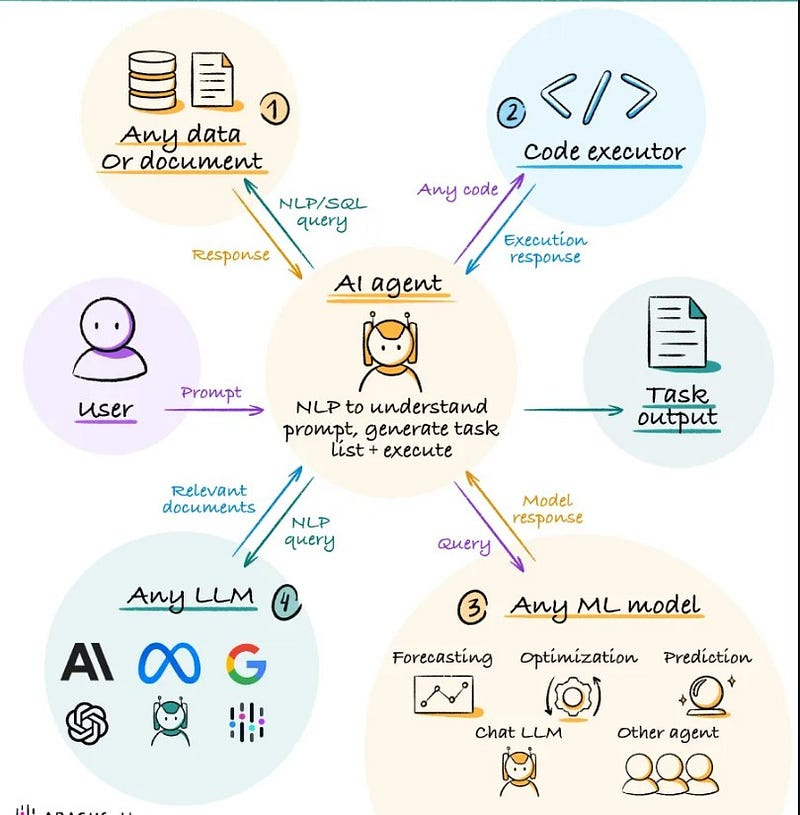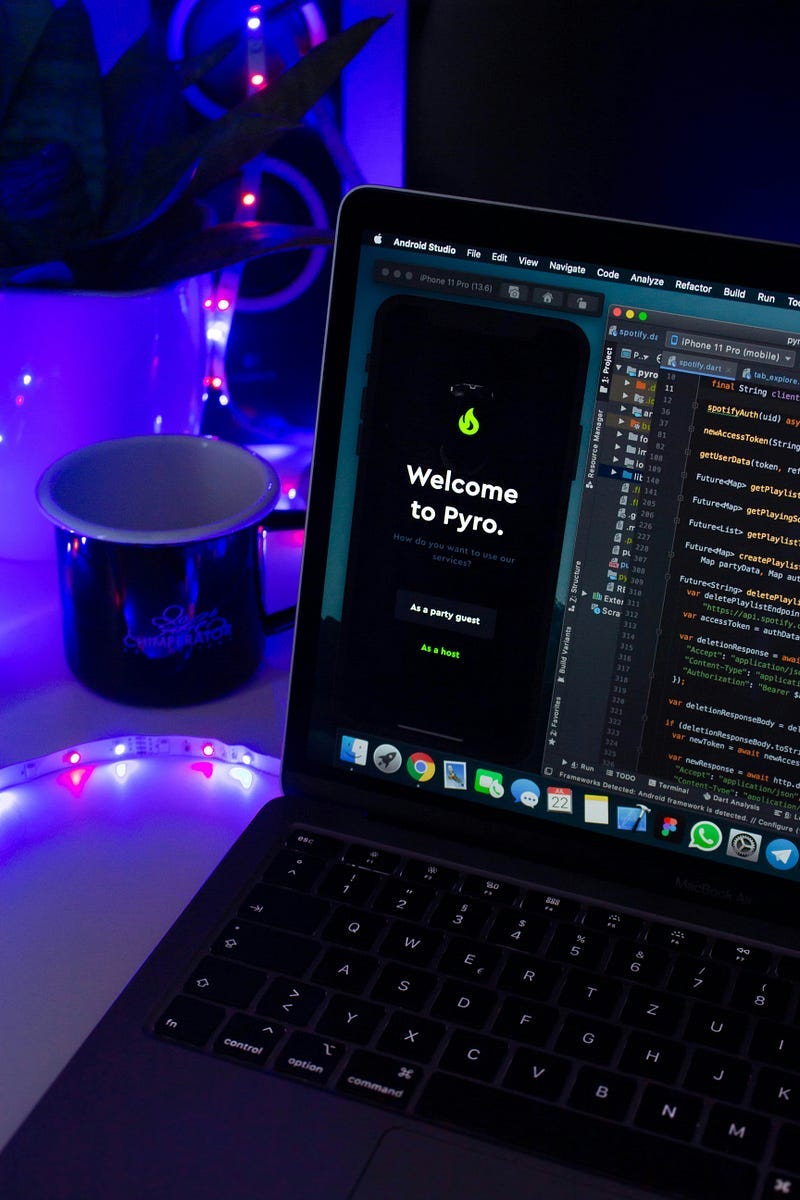AI Agents Are Taking Over: The Game-Changing Systems Revolutionizing Workflows in 2024
Artificial Intelligence is no longer confined to chatbots and predictive models. We’ve officially entered the era of AI agents —…

Artificial Intelligence is no longer confined to chatbots and predictive models. We’ve officially entered the era of AI agents — intelligent systems powered by cutting-edge Large Language Models (LLMs) like GPT-4o, LLaMA-3.1, and Claude 3.5-sonnet. These agents are reshaping industries by automating workflows, optimizing decision-making, and handling complex tasks autonomously.
In this post, I’m breaking down how AI agents are revolutionizing workflows, exploring the latest trends in multi-agent systems, and showing you how to leverage them to supercharge your development and business processes.
So, What Are AI Agents?

Imagine you’re a developer tasked with modernizing a messy legacy codebase, documenting it, and optimizing it for today’s standards. This job could take you weeks, combing through thousands of lines of outdated code. Now? AI agents can tackle that in days — automating the monotonous grunt work.
At their core, AI agents are powered by generative AI, which takes natural language commands, breaks them down into sub-tasks, and executes them across various domains. But these agents aren’t just answering questions like chatbots — they’re writing code, building marketing strategies, assessing financial risks, and even monitoring systems in real time.
And here’s the real kicker: they don’t work alone. In 2024, we’re seeing the rise of multi-agent systems, where AI agents collaborate like an expert team of AI-powered co-workers, each one specialized in a different area. They don’t just assist — they work alongside you, automating even the most complex workflows.
How AI Agents Are Transforming Developer Workflows
Let’s get real about automation. AI agents are stepping up to handle the most time-consuming parts of development.
Code Generation and Documentation: Ask an AI agent to generate code snippets, modernize legacy systems, or document complex systems — it gets the job done. Especially useful in software migrations, where old code needs to be updated for modern platforms. What took weeks? Agents are finishing in days.

Testing and Debugging: These agents aren’t just about writing code — they’re making sure it works. AI agents can automatically generate test cases, review code for bugs, and even offer improvements. Some agents are capable of running quality assurance autonomously, ensuring everything is functioning properly without human intervention.
The best part? These agents learn and adapt. For example, when modernizing legacy code, agents can analyze millions of lines, document them, suggest improvements, and run tests. What used to take developers weeks can now be done by AI in a fraction of the time.
Here’s a quick Python example of an AI agent for code generation:
from transformers import pipeline# Define an AI agent for code generation
code_agent = pipeline("text-generation", model="gpt-4o-mini")# Prompt the agent to write a Python function
prompt = "Write a Python function to calculate the factorial of a number."
response = code_agent(prompt, max_length=100)print(response[0]['generated_text'])This simple prompt lets the AI agent autonomously generate code, which you can adapt or fine-tune to your specific needs. It’s a huge productivity boost for developers who no longer need to manually write repetitive functions or documentation.
Beyond Coding: The Business Case for AI Agents
AI agents aren’t just for developers — they’re breaking into various business domains too. Here are some of the most exciting trends:
Financial Services: AI agents are revolutionizing credit-risk assessments. They handle communications between borrowers and financial institutions, analyze data from multiple sources, and deliver actionable insights for loan underwriting — all while iteratively refining their results.
Marketing Automation: In online marketing, agents are automating everything — from campaign creation to A/B testing. They analyze user behavior, optimize content across different regions, and manage multi-channel strategies — all in real-time.
Healthcare: AI agents are managing patient data, providing diagnostic support, and automating clinical workflows. These agents can pull data from multiple systems, analyze patient history, and give doctors real-time insights based on the latest evidence.
The Challenges in the Age of AI Agents
As promising as they are, AI agents come with their own set of challenges. One major issue is hallucination — where the model generates incorrect or irrelevant outputs. In situations where decisions are automated, this can lead to costly errors. Furthermore, the autonomy of agentic systems requires businesses to rethink how they monitor and manage these systems, ensuring there are proper oversight mechanisms in place.
Another challenge? Integration. AI agents can handle complex workflows, but the lack of standardization across different tools and platforms can make seamless interoperability a struggle. As these systems evolve, developing universal standards will be key.
What’s Next for AI Agents?

As AI continues to evolve, so will AI agents. Expect more industry-specific agents to handle tasks in finance, law, manufacturing, and education. These agents will not only enhance productivity but also redefine how we work.
The age of AI agents is here, and they are poised to become our virtual co-workers — handling everything from complex analysis to mundane, repetitive tasks. The best part? We’re just getting started.
Want to Build Your Own AI Agent?
If you’re ready to experiment with AI agents, platforms like LangChain and Microsoft’s AutoGen offer developer-friendly tools to help you get started. Whether you’re looking to automate workflows, boost productivity, or dive into the world of generative AI, these platforms have everything you need to build your own multi-agent system.
So, are you ready to embrace the future of work with AI agents?
By making the leap into AI agents, you can streamline your workflows, boost efficiency, and stay ahead of the curve. The future of work isn’t just smarter — it’s automated.
Thanks for sticking around until the end. Connect with me on my Linkedin for a more in-depth conversation or any questions.



